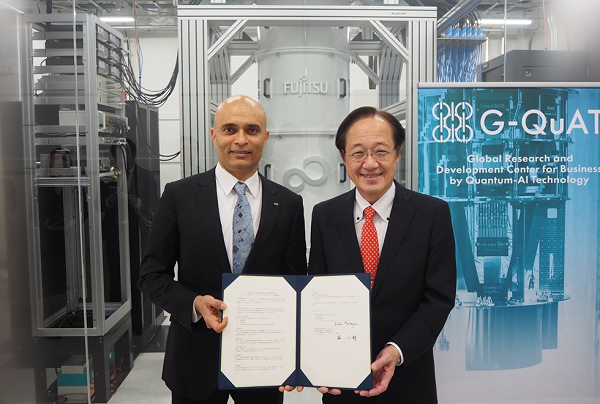On 26 September 2025, Fujitsu Limited and the National Institute of Advanced Industrial Science and Technology (AIST) signed a landmark collaboration agreement that could redefine Japan’s position in the international quantum technology race. This partnership, anchored by AIST’s Global Research and Development Center for Business by Quantum-AI Technology (G-QuAT), seeks to strengthen Japan’s industrial competitiveness by combining deep research expertise with world-class technology development.
While such announcements may sound technical, the implications stretch far beyond laboratories. For Japan, it is about securing its place at the table of nations shaping the future of computing. For industries around the globe, including emerging markets like Nigeria, it is a signal that the quantum era is no longer futuristic speculation—it is already here, and global competition is heating up.
Table of Contents

Fujitsu & AIST Partnership Rooted in Shared Strengths
Fujitsu, long recognised as one of Japan’s flagship technology companies, has been investing heavily in quantum computing. Its focus extends beyond simply building machines—it looks at creating ecosystems where hardware, software, and industrial applications work together seamlessly.
On the other hand, AIST is one of Japan’s most respected public research institutions, with decades of experience translating advanced science into economic and social impact. Through G-QuAT, founded in 2023, AIST has positioned itself as a hub for quantum-AI research, attracting both domestic and international collaborations.
By joining forces, Fujitsu and AIST are pooling their strongest cards. Fujitsu brings quantum-related technologies, manufacturing expertise, and its track record in global partnerships. AIST provides cutting-edge facilities, international research connections, and deep scientific know-how. The agreement formalises the intention to share personnel, run joint projects, and build demonstration environments for large-scale superconducting quantum computers.
For context, superconducting quantum computers are one of the most promising pathways towards practical quantum machines, capable of solving problems beyond the reach of classical supercomputers. But they are notoriously complex: requiring cryogenic cooling, precise error correction, and robust system integration. It is here that collaboration becomes critical.
Why This Matters in the Global Race
Quantum computing is not just another research trend—it has the potential to revolutionise industries. From drug discovery and financial modelling to climate forecasting and cybersecurity, quantum machines could unlock solutions that classical computers cannot reach.
But there is a global scramble. The United States, China, the European Union, Canada, and even Australia are heavily investing in quantum research. Multinationals like Google, IBM, and Microsoft have already demonstrated prototypes. In such a high-stakes race, countries risk being left behind if they cannot compete at scale.
This is why the Fujitsu-AIST agreement matters. It gives Japan a stronger foothold by aligning public research infrastructure with private-sector dynamism. The deal aims to make Japanese component manufacturers internationally competitive, opening doors for global supply chains. It also ensures that Japan’s advances will not remain siloed in labs but find pathways to commercialisation.
In practical terms, this collaboration could produce tangible results: verified technologies, international partnerships, and talent pipelines. For instance, engineers and researchers will move between Fujitsu and AIST, exchanging skills while building systems that can scale. Such cross-pollination of expertise is vital in a field where breakthroughs depend on blending physics, engineering, and software development.

Lessons and Opportunities for Emerging Markets
Though this agreement is centred in Japan, its ripple effects are global. For countries like Nigeria and other African nations, the deal underscores the importance of proactive investment in future technologies. Quantum computing may feel distant when local economies still grapple with basic digital infrastructure, but ignoring the trend could mean widening the technological gap in the future.
Nigeria, for instance, is producing more tech graduates than ever before and has a vibrant start-up ecosystem. While the country may not be building quantum computers today, opportunities lie in training talent, investing in specialised research, and creating partnerships with global players. Nigerian universities could, for example, collaborate with Japanese institutions to expose students to emerging areas in quantum science and artificial intelligence.
Beyond research, quantum technology will influence industries Nigeria already depends on. Financial services, logistics, energy, and agriculture all stand to benefit from quantum-powered optimisation. As global supply chains evolve, countries that can integrate with leading nations like Japan will be better placed to seize new opportunities.
Looking Ahead: A Defining Decade for Quantum Tech
The Fujitsu-AIST collaboration is not a finish line—it is the start of a long journey. Building practical, large-scale quantum computers will take years of rigorous work, billions in investment, and international cooperation. Yet the significance of this agreement lies in its clarity of vision: Japan does not intend to merely follow global leaders; it wants to shape the future of quantum technology.
The global race will intensify over the next decade, with milestones like quantum error correction, hardware scaling, and commercial applications acting as benchmarks. Japan’s ability to deliver on these fronts will depend on how well this partnership can translate theory into systems ready for industrial adoption.
For observers in Africa, this is also a call to action. The world is moving fast, and technology leadership will define economic competitiveness in the 21st century. Just as the mobile revolution reshaped African economies in the 2000s, the quantum revolution could unlock a new chapter—if investments are made early enough.

Conclusion
The partnership between Fujitsu and AIST is more than a memorandum of understanding; it is a bold declaration of intent. By strengthening their collaboration, they are betting on Japan’s ability to lead in quantum technology and compete internationally.
For Japan, it is a chance to reassert industrial competitiveness. For the global community, it is another sign that the quantum era is shifting from theory to tangible action. And for countries like Nigeria, it is a reminder: the future will not wait, and those who prepare today will define tomorrow.
Join Our Social Media Channels:
WhatsApp: NaijaEyes
Facebook: NaijaEyes
Twitter: NaijaEyes
Instagram: NaijaEyes
TikTok: NaijaEyes




